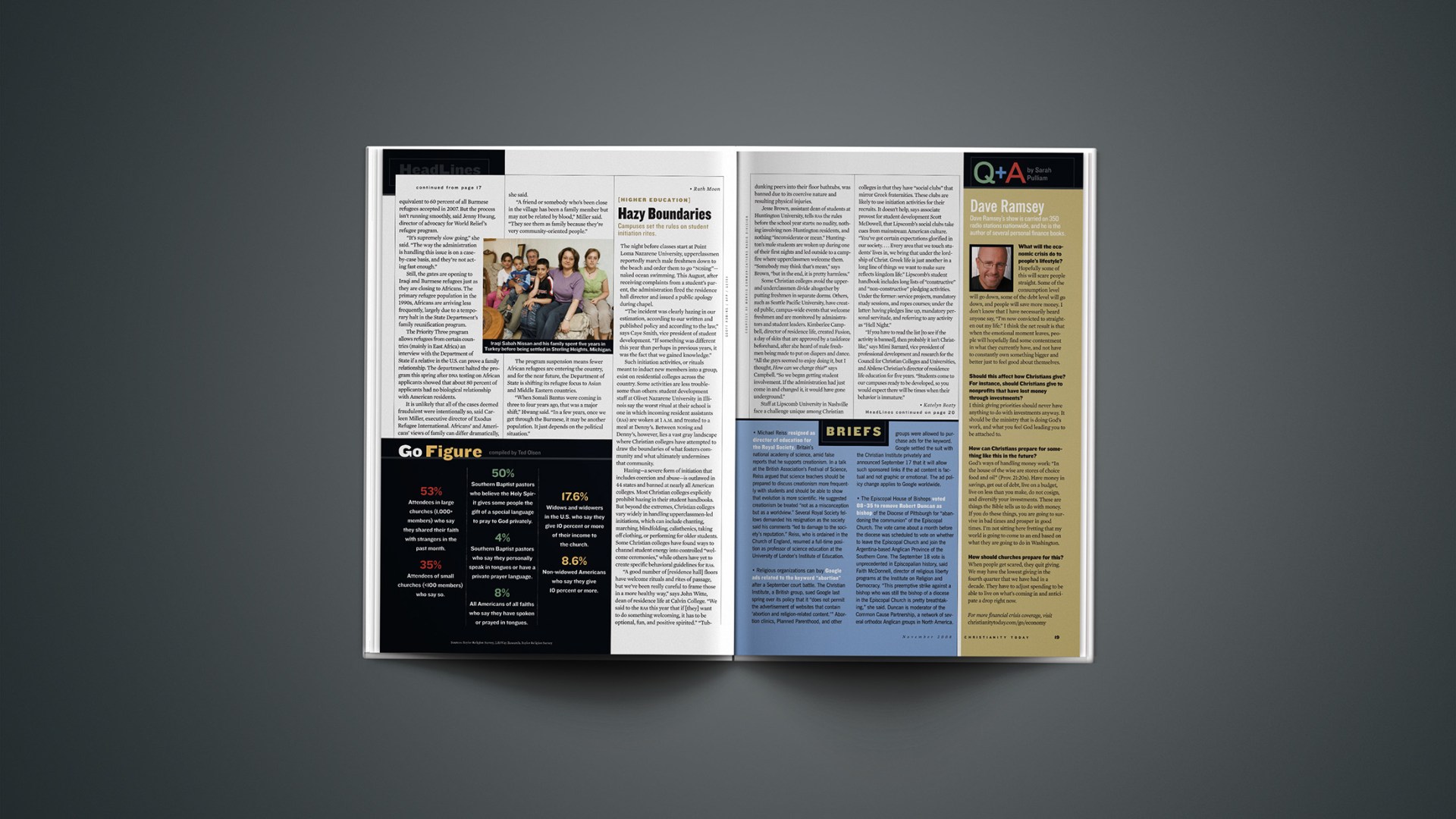The night before classes start at Point Loma Nazarene University, upperclassmen reportedly march male freshmen down to the beach and order them to go “NOSing”— naked ocean swimming. This August, after receiving complaints from a student’s parent, the administration fired the residence hall director and issued a public apology during chapel.
“The incident was clearly hazing in our estimation, according to our written and published policy and according to the law,” says Caye Smith, vice president of student development. “If something was different this year than perhaps in previous years, it was the fact that we gained knowledge.”
Such initiation activities, or rituals meant to induct new members into a group, exist on residential colleges across the country. Some activities are less troublesome than others: student development staff at Olivet Nazarene University in Illinois say the worst ritual at their school is one in which incoming resident assistants (RAs) are woken at 1 A.M. and treated to a meal at Denny’s. Between NOSing and Denny’s, however, lies a vast gray landscape where Christian colleges have attempted to draw the boundaries of what fosters community and what ultimately undermines that community.
Hazing—a severe form of initiation that includes coercion and abuse—is outlawed in 44 states and banned at nearly all American colleges. Most Christian colleges explicitly prohibit hazing in their student handbooks. But beyond the extremes, Christian colleges vary widely in handling upperclassmen-led initiations, which can include chanting, marching, blindfolding, calisthenics, taking off clothing, or performing for older students. Some Christian colleges have found ways to channel student energy into controlled “welcome ceremonies,” while others have yet to create specific behavioral guidelines for RAs.
“A good number of [residence hall] floors have welcome rituals and rites of passage, but we’ve been really careful to frame those in a more healthy way,” says John Witte, dean of residence life at Calvin College. “We said to the RAs this year that if [they] want to do something welcoming, it has to be optional, fun, and positive spirited.” “Tubbing,” a Calvin tradition of male students dunking peers into their floor bathtubs, was banned due to its coercive nature and resulting physical injuries.
Jesse Brown, assistant dean of students at Huntington University, tells RAs the rules before the school year starts: no nudity, nothing involving non-Huntington residents, and nothing “inconsiderate or mean.” Huntington’s male students are woken up during one of their first nights and led outside to a campfire where upperclassmen welcome them. “Somebody may think that’s mean,” says Brown, “but in the end, it is pretty harmless.”
Some Christian colleges avoid the upperand underclassmen divide altogether by putting freshmen in separate dorms. Others, such as Seattle Pacific University, have created public, campus-wide events that welcome freshmen and are monitored by administrators and student leaders. Kimberlee Campbell, director of residence life, created Fusion, a day of skits that are approved by a taskforce beforehand, after she heard of male freshmen being made to put on diapers and dance. “All the guys seemed to enjoy doing it, but I thought, How can we change this?” says Campbell. “So we began getting student involvement. If the administration had just come in and changed it, it would have gone underground.”
Staff at Lipscomb University in Nashville face a challenge unique among Christian colleges in that they have “social clubs” that mirror Greek fraternities. These clubs are likely to use initiation activities for their recruits. It doesn’t help, says associate provost for student development Scott McDowell, that Lipscomb’s social clubs take cues from mainstream American culture. “You’ve got certain expectations glorified in our society. … Every area that we touch students’ lives in, we bring that under the lordship of Christ. Greek life is just another in a long line of things we want to make sure reflects kingdom life.” Lipscomb’s student handbook includes long lists of “constructive” and “non-constructive” pledging activities. Under the former: service projects, mandatory study sessions, and ropes courses; under the latter: having pledges line up, mandatory personal servitude, and referring to any activity as “Hell Night.”
“If you have to read the list [to see if the activity is banned], then probably it isn’t Christlike,” says Mimi Barnard, vice president of professional development and research for the Council for Christian Colleges and Universities, and Abilene Christian’s director of residence life education for five years. “Students come to our campuses ready to be developed, so you would expect there will be times when their behavior is immature.”
Copyright © 2008 Christianity Today. Click for reprint information.
Related Elsewhere:
The San Diego Union-Tribune reported on hazing at Point Loma Nazarene:
The Lipscomb University’s guidelines for hazing in the student handbook (pages 27-28).
The Council for Christian Colleges and Universities did a report on “Christian college alternatives to Greek life.”
Online resources on hazing include, StopHazing.org, Hazing Prevention.org, and the National Center for Hazing Research and Prevention.










